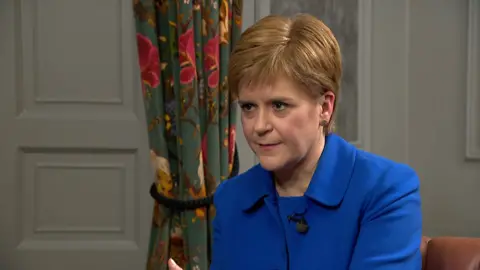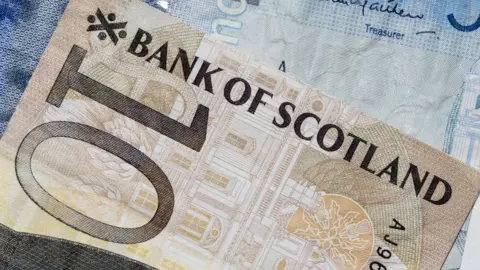General Election 2019: Scotland would 'seek a way back in' to EU
An independent Scotland could rejoin the EU on a "relatively quick" timescale, Nicola Sturgeon has said.
The Scottish first minister and SNP leader wants a new referendum on independence to be held in 2020, and is also opposed to the UK leaving the EU.
She told the BBC that Scotland would be "seeking a way back in" to the EU if Brexit happened.
The Conservatives have claimed that a Labour government backed by SNP votes would lead to two referendums in 2020.
The SNP leader was taking part in a special interview with Andrew Neil as part of the build-up to the snap general election on 12 December.
Other party leaders are also set to be quizzed by Mr Neil, with Labour's Jeremy Corbyn to follow on Tuesday.
Ms Sturgeon has said her SNP MPs could potentially help to put Mr Corbyn in Downing Street in the event of a hung parliament, but said the Labour leader must first accept the "fundamental principle" that an independence referendum should be "in Scotland's hands".
She told Mr Neil that she would always back a new, UK-wide EU referendum but said there was "no guarantee that fixes the problem for Scotland", as "we could end up with exactly the same result we had in 2016" - with a majority in Scotland backing Remain, while the UK as a whole votes to Leave.

Questioned about how swiftly an independent Scotland could re-enter the EU, Ms Sturgeon said she did not want to set out a "specific timescale", but said talks she had had previously meant she thought it would be "relatively quick".
She explained: "We understand the conditions we would require to meet, and the discussions that would require to take place. But if we're in a position of Scotland being taken out of the European Union then we will be seeking a way back in."
The SNP currently plan to have Scotland continue to use the pound in the years immediately after independence, before establishing a new currency after a series of stringent economic tests are met.
Challenged on whether Scotland could join the EU while using the currency of a non-member state, Ms Sturgeon said this was possible.
She said: "We would be setting up a central bank, the infrastructure that is required for that, that is part of the discussion we would have with the EU, but it is not true to say we would have had to establish an independent currency before joining the European Union."
The MSP added: "We would have a discussion with the EU about the journey an independent Scotland was on in terms of currency, and the accession if Scotland was already out of the EU to the point where we rejoined the EU.
"Scotland faces right now the uncertainty of being ripped out of the EU against our own will. It's not of our making. And we need to plot the best way forward for our country where we are in charge of the decision that we make."
 Getty Images
Getty ImagesMs Sturgeon also said an independent Scotland would "aspire to run a surplus" through faster economic growth, which she said would be aided by remaining in or returning to the EU.
Pressed on trade friction if Scotland was inside the EU and the rest of the UK was not, Ms Sturgeon said it was "a priority" to ensure smooth movement of goods and services.
She said: "We don't yet know what the UK's final relationship with the EU will be. Once we have clarity on that we have to understand the implications and set out clearly how we deal with those, in order to keep trade flowing between Scotland and England, which is in our interests and in the interests of the rest of the UK.
"It is also in our interests to stay in the single market, which is eight times the size of the UK market. The experience of Ireland, albeit at a different time in history, is when they combined independence with membership of the EU, their exports to the EU grew and they became more prosperous. That's the best of both worlds I believe Scotland can attain."
Ms Sturgeon also came under pressure on her domestic record on health which has seen Scotland's largest health board being placed in "special measures" and calls for her health secretary to resign.
A recent report by Audit Scotland highlighted that just two out of eight key waiting time standards had been met and warned that the NHS in Scotland could face a £1.8bn shortfall in less than five years if it is not reformed.
Ms Sturgeon acknowledged there were problems, adding: "All health services everywhere face these challenges. We are not immune from that but I believe we are doing the things that are required."
'Nightmare on Downing Street'
The Conservatives have said a Jeremy Corbyn government at Westminster - potentially supported on an issue-by-issue basis by the SNP - could lead to two referendums in 2020, on Brexit and independence.
Prime Minister Boris Johnson said a "coalition of chaos" between the two parties would be a "nightmare on Downing Street".
Launching his party's manifesto, he "confidently prophesised" that in 10 years' time "people will be passionately proud of their Scottish identity, and their Welsh and Northern Irish, and - yes - their English identity".
He added: "We will also all be a proud strong and whole United Kingdom, more united than ever, flying that red, white and blue union flag that represents the best of our values, from democracy and the rule of law."
Labour meanwhile have said they would not back a new independence vote within the "early years" of a Corbyn-led administration at Westminster.
Scottish leader Richard Leonard told BBC Scotland on Monday that a request for a referendum "would not be blocked" by a UK Labour government if there was a pro-independence majority after the Holyrood elections in 2021.
However, he said Labour would be seeking to win that election, and restated his opposition to independence.
The Scottish Lib Dems are opposed to both Brexit and independence, with campaign chairman and MSP Alex Cole-Hamilton saying the party is seeking to "reclaim our lost heartlands" in the Highlands and Fife while "breaking new ground" in areas like Edinburgh which recorded a heavy Remain vote in 2016.

- CONFUSED? Our simple election guide
- POLICY GUIDE: Who should I vote for?
- POLLS: How are the parties doing?
- A TO Z: Our tool to explain election words
- REGISTER: What you need to do to vote

